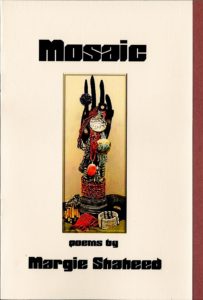
 Author’s Note: Margie Shaheed on Mosaic
Author’s Note: Margie Shaheed on Mosaic
– “These are the poems of a storyteller clearly connected to her African ancestry, oral tradition, and the history of Black people in America.” Dr. Mary E. Weems, Ohioana Quarterly, Summer/Fall 2013
Mosaic is a chapbook of storytelling poems. I learned the art of storytelling from my mother who was privately a poet. She told the best stories and she wrote poetry always careful with details and she had impeccable timing. I naturally bring this element into my work because I believe /we are poem with story to tell/. I see poetry as a reflection of life. And, in order for my poems to echo life they must breathe. Powerful imagery is important and propels the poem along so I approach each poem as if it is a photo made up of words.
As an African-American writer, I am most inspired by my culture and the colorful language of my people. As a result, I often use Black cultural references and colloquialisms in my work. Black English and dialogue are my other essentials because I feel that Black speech has a singular rhythm, which is akin to a pulse or heartbeat. A good example of this is contained in my poem, “Nostalgic Hair Affair”, a snapshot memory of getting my hair combed as a girl by my mother. As you can imagine the experience was painful and dreaded. We hear this Black speech with all of its vibrancy coming from the mouth of one of my friends as I reminisce about meeting her for the first time. She asks me a question and proceeds to answer it too, /Do you know why dey call me Silk? Cuz, Ah’m sooo Black/ If you was to rub some Vaseline on mah skin right now/I’d look jus’ like a pair of black silk stockin’s/.
I once heard the poet Amiri Baraka, when asked by a student how do you know when you’ve written a good poem, respond, “take your poem down and let a construction worker hear it. If he understands it then you know you’ve got something.” I want to have “something.” It is my desire to write poems that are clear and relatable to average people without compromising or losing the poetic or what some would call the music of the line. This calls for a set of skills I am constantly working to achieve, refine and build upon.
One of my favorite poems in Mosaic is “PraiseSong for Yemonja and Osun”. This poem is women-centered and spiritually uplifting and is sort of like a prayer as it implores us to heal, evolve and transform into better human beings. Mosaic also features poems for Trayvon Martin and Marissa Alexander. Other topics like homelessness, love, birth, and domestic violence are covered as well. On this note, I’ll end where Mosaic begins, with a poem about writing:
The Moody Muse
A basket weaver,
I sit in the marketplace
of my dining room, hand picking words.
My smooth brown fingers
rummage through the heap of sound
piled at my feet, weaving bright hues
and alluring textures, enticing me
—each sound—vying to become
a part of my prized basket.Fussier words pique my curiosity
with differences between their
denotative and connotative meanings.
I am perplexed, when a pronunciation
or syllabic formation disturbs the rhythm
and meter of my pattern.Meticulously, happily,
I dig into the mound.
I choose a ribbon, a color, a sound,
a word, and then another,
until slowly, steadily, and surely
my basket takes shape.When it is complete,
I place it high up on the china cabinet.
I step back with folded arms
to get a better view of this woven sound.
As my eyes scrutinize its intricate design,
I wonder if it will sell at the square today…
Mosaic
Poems by Margie Shaheed
NightBallet Press 2013
